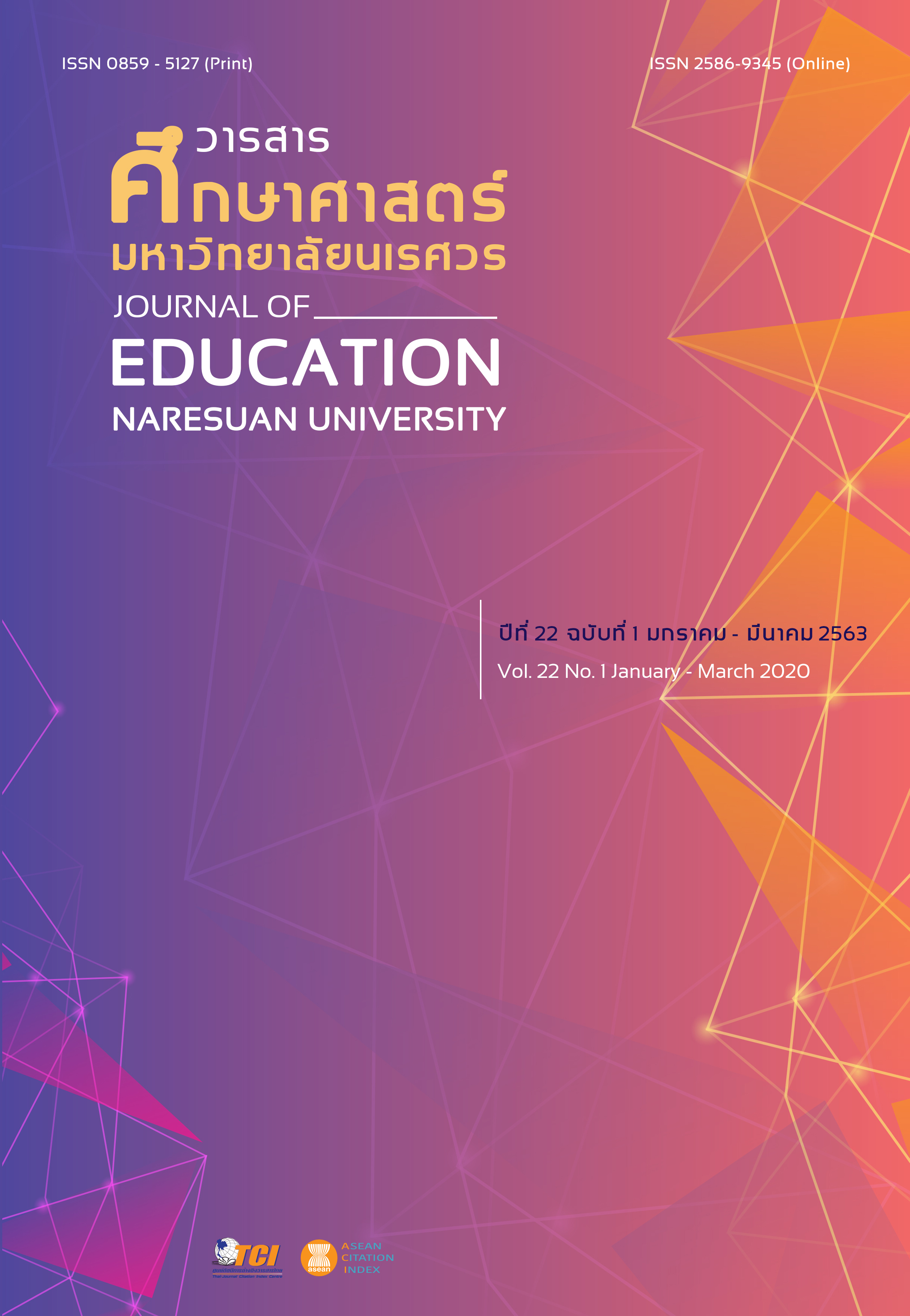COMMUNITY KNOWLEDGE MANAGEMENT FOR MANGROVE FOREST MANAGEMENT
Main Article Content
Abstract
The objectives of this research were as follows: to study the management of mangrove forest, community knowledge management process for mangrove forest management, and the factors supporting of community knowledge management for mangrove forest management through participatory action research at Ban Bang Kluainok, Tambon Kamphun Amphoe Suksamran, Changwat Ranong, and then all the results were analyzed by using content and descriptive analysis. The finding were as follows; 1) the community is planting mangroves, leave marine species in the mangrove areas, and establishes Mangrove forest rules, 2) community knowledge management consists of 12 steps, including defining the knowledge topics, pursuits knowledge, creating knowledge, the knowledge of the system, screening and processing knowledge, access to knowledge, the exchange and sharing of knowledge, the transfer of knowledge, to learn, the knowledge to use, store of knowledge, and evaluation of knowledge, and 3) factors supporting of knowledge management community, consisting of 17 factors, including the participation of community members, style learning activities, the goals and mutual benefits, leaders and Leadership, opportunities for the knowledge exchange and learning, knowledge management driven team, management, communications of the community, knowledge and skills of people, the relationship of community members, the culture of the community, praise and reward, the measurement and evaluation, the structure of the community, the history of the struggle of the community, support from external agencies, and information technology.
Article Details
The owner of the article does not copy or violate any of its copyright. If any copyright infringement occurs or prosecution, in any case, the Editorial Board is not involved in all the rights to the owner of the article to be performed.
References
Aksornkoae, S. (1999). Mangrove ecology and management. Bangkok: Kasetsart University Press. [in Thai]
Appleton, J. V. (1995). Analyzing qualitative interview data: Addressing issues of validity and reliability. Journal of Advanced Nursing, 22, 993-997.
Boonyakit, B., et al. (2004). Knowledge Management, from Theory to Practice. Bangkok: Jirawat Express. [in Thai]
Chantavanich, S. (2009). Qualitative research methodology (17th ed.). Bangkok: Chulalongkorn University Press. [in Thai]
Demarest, M. (1997). Understanding knowledge management. Long Range Planning, 30(3), 374-384.
Department of Marine and Coastal Resources. (2009). Master Plan for Mangrove Management in Thailand. Bangkok: Ministry of Natural Resources and Environment. [in Thai]
Heisig, P. (2001). Knowledge management: Best practices in Europe. New York: Springer Verlag.
Kucza, t. (2001). Knowledge management process mode. U.S.A.: Harvard Business School Press.
Leonard-Barton, D. (1995). Wellsprings of Knowledge: Building and sustaining the sources of innovation. Boston: Harvard Business School Press.
Makaew, P. (2013). The management of the community forest in Baan Don-Moon, Muang Chum Sub District, Wiang Chai District, Chiang Rai Province. Area Based Development Research Journal, 5(6), 38-53. [in Thai]
Marquardt, M. (2002). Building the learning organization: A system approach quantum improvement and success. New York: Mcgraw-Hill.
Nonaka, I., & Takeuchi, H. (1995). The knowledge-creating company: How Japanese companies create the dynamics of innovation. New York: Oxford University Press.
Padungchat, D. Member of Naka Sub District Administration Organization, Amphoe Suksamran, Changwat Ranong. (23 April 2015). Interview. [in Thai]
Panich, V. (2005). Knowledge management: Practitioners issue. Bangkok: Sokjai Press. [in Thai]
Pravanpuk, W. (1995). The action research planner. Bangkok: Department of Education, Ministry of Education. [in Thai]
Probst, G., Raub, S., & Romhardt, K. (2000). Managing knowledge building blocks for success. England: John Willey & Sons.
Sanprang, N., Chaowakeeratipong, T. & Polprasert, P. (2015). The development of knowledge management strategies of primary schools under Kamphaeng Phet Primary Educational Service Area Office 1 and 2. Journal of Education, Naresuan University, 17(2), 13 – 26. [in Thai]
Santasombat, Y., et al. (2004). Ethnic ecological, genetic resources and community rights. Chiang Mai: Win Indesign. [in Thai]
Sedera, D., & Gable, G. (2010). Knowledge management competence for enterprise system success. Journal of Strategic Information System, 19, 296-306.
Soonthornnawaphat, S. (2007). Mangrove rehabilitation community guidelines. Bangkok: International Union for Conservation of Nature. [in Thai]
Sri–in, S. (2011). Community mangrove forest management on the Andaman coast, Thailand. Journal of Agroforestry and Environment Official of Agroforestry Society of Bangladesh: Bangladesh, 5, 55-59.
Sriphan, A. (2012). Knowledge management for communities empowerment follow sufficiently economy philosophy by communities learning centers based learning in Phitsanulok Province. Phitsanulok: Naresuan University. [in Thai]
Sukwong, S. (2007). Community forestry. Bangkok: Sarakadee. [in Thai]
Trapp, H. (1999). Benefits of an internet-based knowledge management system- measuring the effects. Retrieved August 19, 2014, from https://www.avinci.delcompetence/publikatinoeu/diplomarbeit-holge-trapp.pdf
Turban, et al. (2004). Information technology for management: Transforming organizations in the digital economy (4th ed.). New Jersey: John Wiley & Sons.
Wichan, B. (2004). Knowledge management in action. Bangkok: Expertnet. [in Thai]
Wichianpanya, P. (2004). Knowledge management: Basic and applied. Bangkok: Expertnet. [in Thai]
Wipawin, N. (2004). Knowledge management and knowledge center. Bangkok: S R Printing Mass Product. [in Thai]
Wiig, K. (2003). Knowledge management foundations. U.S.A.: Schema Press.
Wongprasert, C. (2005). Knowledge management for business firms. Bangkok: Expernet. [in Thai]


